AI Innovations Driving Ecommerce Customer Service Success
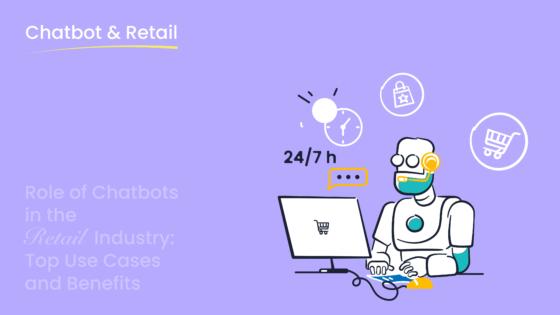
AI has dramatically reshaped ecommerce customer service in 2025, with 95% of all customer interactions now managed by AI-powered systems. Modern ecommerce trends show that AI-driven tools like chatbots, predictive analytics, and product recommendations elevate cx and drive business growth. Companies leveraging these ai trends report higher customer experience scores and operational efficiency. For example, Sephora saw an 11% conversion boost after deploying AI recommendations. Sobot AI stands out by delivering seamless cx across channels, and Sobot call center solutions help brands gain a competitive edge in today’s fast-changing ecommerce customer service landscape.
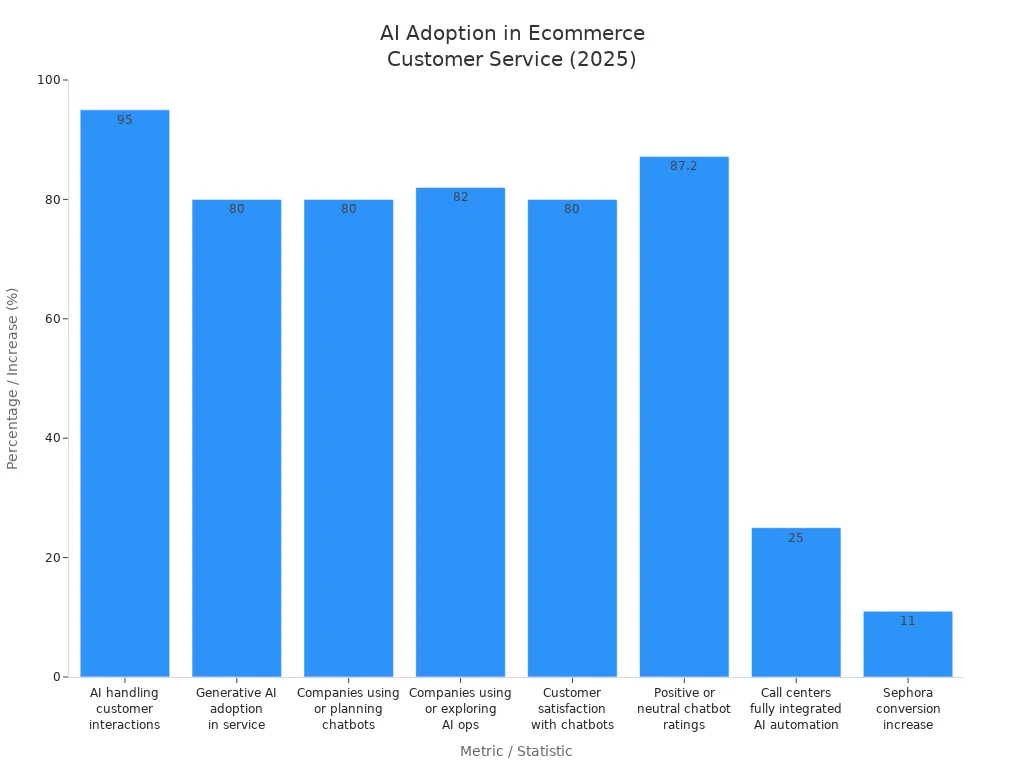
Customer Service Trends 2025
Key Trends Overview
Ecommerce trends in 2025 show a major shift in how brands approach customer service. Companies now rely on ai to deliver faster, smarter, and more personalized cx. The top customer service trends include:
- Ai and automation drive agent productivity and improve customer experience.
- Hyper-personalization anticipates customer needs before they ask.
- Trust and privacy remain central as brands personalize service.
- Human touch stays important, even with advanced ai.
- Proactive customer service emerges as brands integrate data across systems.
- Businesses invest more in cx, seeing it as a key differentiator.
- Digital-native customers expect intuitive, real-time, and tailored experiences.
These trends reflect the growing demand for seamless, omnichannel support. Sobot, for example, uses ai-powered chatbots and voice solutions to help brands meet these new expectations. Sobot’s platform supports multilingual, 24/7 service, and integrates with popular channels like WhatsApp, making it easier for companies to deliver consistent cx.
Impact on Ecommerce Customer Service
The latest ecommerce trends have transformed ecommerce customer service. Ai now handles most routine queries, freeing agents to focus on complex issues. Brands see a 70% boost in productivity and up to 50% cost savings by using ai-driven automation. Hyper-personalization powered by predictive analytics helps companies offer relevant recommendations and support, which increases customer satisfaction and loyalty.
Proactive customer service, enabled by real-time data integration, allows businesses to resolve issues before they escalate. Companies like Sobot lead this shift by providing unified platforms that connect chat, voice, and social media. This approach ensures a seamless cx across every touchpoint. As ai trends continue to evolve, brands that embrace these shifts gain a clear advantage in the competitive ecommerce landscape. For more insights on digital customer experience, see Forrester’s CX research.
AI-Powered Automation
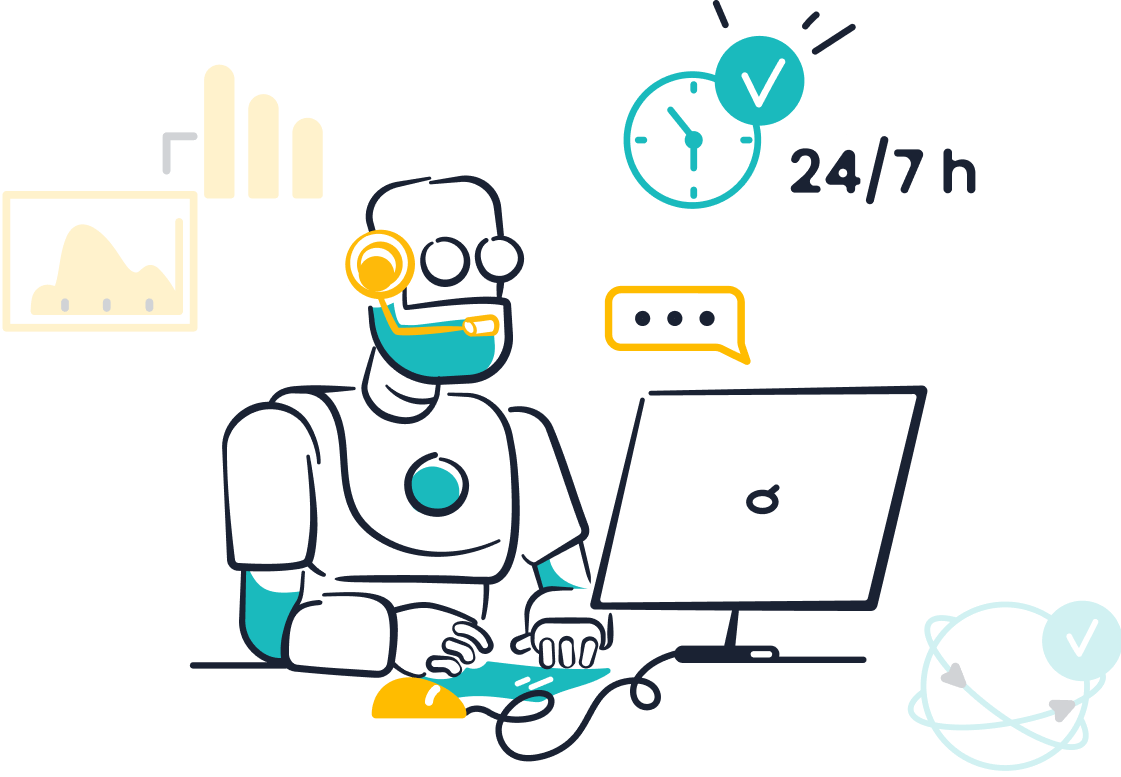
Automation in Customer Service
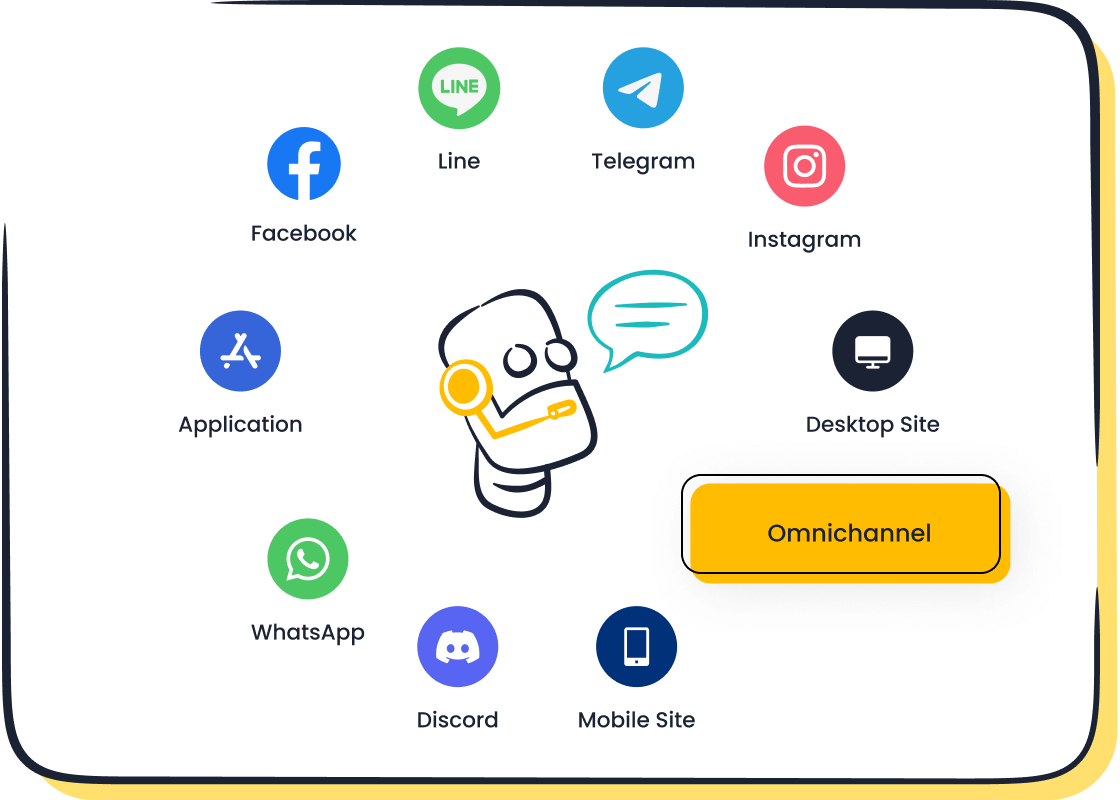
AI-powered automation has become a cornerstone of modern customer service. Companies now use ai tools to handle large volumes of customer inquiries at any time of day. Chatbots, virtual assistants, and other ai-powered tools automate routine tasks such as ticket routing, data entry, and email classification. This shift allows human agents to focus on complex issues that require empathy and problem-solving skills. Sobot’s AI Solution and chatbot stand out in this area. The Sobot chatbot automates up to 70% of customer inquiries, reducing manual agent involvement and achieving response times under one minute. Sobot’s omnichannel ai tools integrate with platforms like Shopify, Amazon, and WhatsApp, ensuring seamless customer service automation across all channels.
Companies using ai in customer service report significant improvements in customer satisfaction and loyalty. Metrics such as Customer Satisfaction Scores (CSAT) and Net Promoter Scores (NPS) often rise by 30% or more after implementing automated customer service solutions.
Benefits for Ecommerce
Ecommerce businesses experience measurable gains from automation. AI-powered automation reduces operational costs by up to 30% by eliminating repetitive, labor-intensive tasks. Companies see a 50% improvement in operational efficiency and 25% faster processing times. Sobot’s ai tools help ecommerce brands scale order processing to 15 times the normal volume during peak sales events without hiring extra staff. The table below highlights key benefits:
| Benefit Area | Measurable Improvement | Example/Detail |
|---|---|---|
| Order Processing Scalability | 15x normal volume during peak | Maintained 99.8% accuracy during annual sale |
| Customer Satisfaction | 30-50% improvement | Enhanced by ai workflow automation |
| Agent Workload Reduction | 60% decrease | Agents focus on complex tasks |
| Cost Savings | 20-40% reduction in operating expenses | AI eliminates manual work |
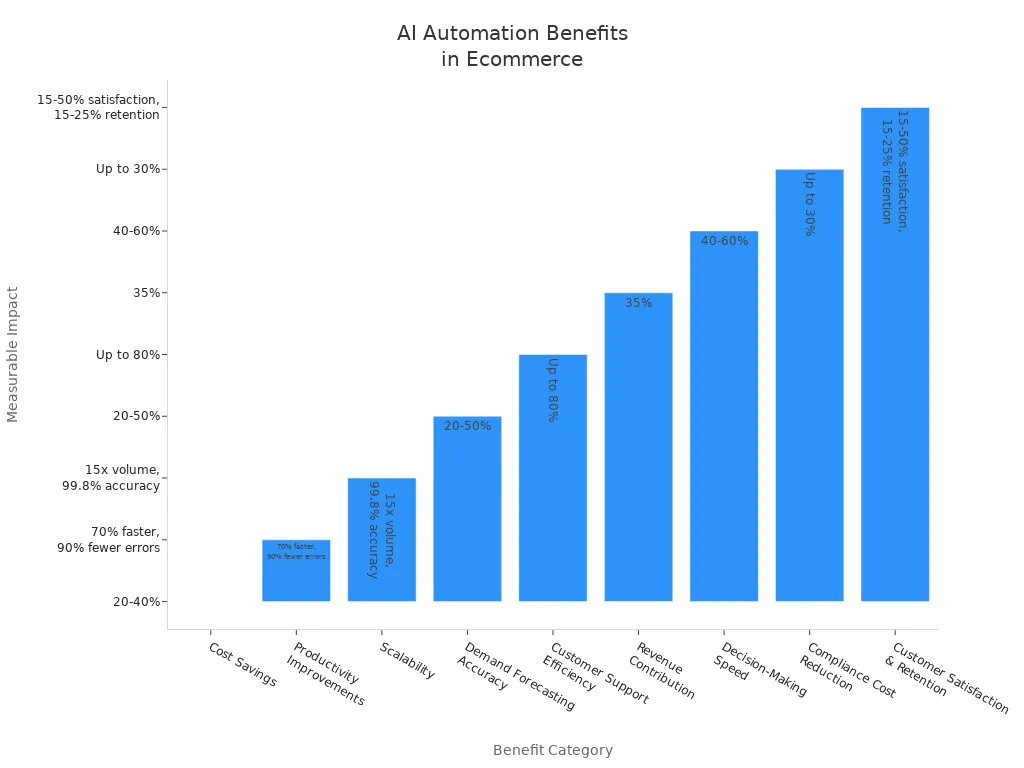
Sobot’s ai-powered tools also enable proactive marketing, personalized communication, and automated booking. These features drive higher conversion rates and customer retention. As ecommerce continues to grow, customer service automation remains essential for delivering fast, accurate, and scalable support.
Hyper-Personalization in Customer Experience
Personalization with AI
AI has transformed customer experience in ecommerce by enabling hyper-personalization at scale. Unlike traditional methods that rely on broad segmentation, AI in cx uses real-time behavioral analysis to deliver one-to-one shopping journeys. AI systems track customer actions, analyze browsing history, and adjust product recommendations instantly. This approach creates a personalized service that feels unique to each shopper.
Sobot’s AI-powered chatbot leverages advanced machine learning to provide dynamic recommendations and proactive support. The chatbot adapts to customer behavior, offering relevant suggestions and personalized service across multiple channels. Customers receive consistent cx whether they interact through chat, voice, or social media. This seamless experience increases satisfaction and loyalty.
The table below compares traditional personalization with AI-driven customer experience:
| Feature/Aspect | Traditional Personalization | AI-Driven Personalization |
|---|---|---|
| Basis of Personalization | Broad segmentation | Real-time behavioral analysis |
| Adaptability | Static | Instantly adapts to changes |
| Data Utilization | Limited | Analyzes vast datasets |
| Predictive Capability | Minimal | Anticipates customer needs |
| Cross-Channel Consistency | Inconsistent | Seamless across all channels |
| Personalization Depth | Generic | Hyper-targeted, individualized |
| Responsiveness | Slow | Real-time, dynamic |
AI in cx enables brands to deliver hyper-personalization that drives higher conversion rates and operational efficiency. Customers feel recognized and valued, which boosts retention. Research shows that 31% of shoppers are more likely to stay loyal due to personalized shopping experiences.
Real-Time Predictive Analytics
Real-time predictive analytics have become essential for delivering superior customer experience in ecommerce. AI-powered analytics engines capture user behavior instantly, enabling dynamic product recommendations and personalized service. These engines use machine learning and natural language processing to analyze browsing habits, purchase history, and contextual factors.
Sobot’s AI Solution integrates predictive analytics to optimize cx. The platform provides instant insights, allowing brands to tailor promotions and communication campaigns. For example, Sobot’s chatbot can send personalized emails and SMS based on predictive modeling, increasing engagement and conversion rates.
Recent advancements allow platforms to automate personalization at scale. Tools like Dynamic Yield and Bloomreach use AI to predict shopper interests and deliver real-time recommendations. Academic research confirms that algorithmic recommendation systems influence consumer spending and improve retention. AI-driven customer experience extends beyond product suggestions, simplifying returns and exchanges. Instant refunds powered by AI increase repurchase likelihood by 35%, enhancing overall cx.
Tip: Brands using AI in cx report conversion rate increases of up to 9% and improved customer lifetime value. For more details, see McKinsey’s report on personalization.
Conversational AI and Chatbots

Chatbot Innovations
Ecommerce continues to grow, with global sales projected to reach $6.3 trillion in 2024 (Statista). Customers expect fast, personalized cx and flexible self-service support. Conversational ai tools now use generative ai to understand natural language, automate transactions, and deliver human-like shopping assistance. These ai tools help businesses provide instant answers, automate order updates, and recommend products based on real-time data.
Recent innovations include chatbots that act as virtual consultants, automate scheduling, and handle complex inquiries. For example, David’s Bridal’s Zoey chatbot managed $30,000 in automated sales within weeks by guiding customers through the buying process. Sobot’s ai-powered chatbot stands out by offering 24/7 availability, no-code setup, and omnichannel integration. Businesses use Sobot to automate up to 70% of customer support tasks, improving agent productivity and reducing costs. The chatbot’s self-service support features allow customers to resolve issues independently, boosting satisfaction and loyalty.
Key performance indicators for conversational ai include conversation starter messages, bot intent analytics, and goal completion rates. Companies track metrics such as chat volume, successful interactions, and customer satisfaction scores to measure the impact of ai-driven support.
Multilingual and Omnichannel Support
Modern ai tools enable multilingual and omnichannel customer support, meeting the needs of global shoppers. Chatbots with 24/7 availability provide instant self-service support, regardless of time zone. Multilingual capabilities let businesses communicate in customers’ native languages, increasing accessibility and engagement. Sobot’s chatbot supports multiple languages and channels, including WhatsApp, Facebook Messenger, and SMS.
Omnichannel chatbots unify conversations from different platforms, creating a seamless cx. They use natural language processing to interpret messages and respond with accurate information, product suggestions, or order updates. If a chatbot cannot resolve a query, it transfers the conversation to a human agent with full context, ensuring fast resolution. Sobot’s partnership with Weee! demonstrates these benefits. Weee! improved agent efficiency by 20% and reduced resolution time by 50% after implementing Sobot’s voice and chatbot solutions. Customer satisfaction reached 96%, showing the value of multilingual and omnichannel ai in customer support.
Tip: Businesses using multilingual and omnichannel chatbots see a 67% increase in customer satisfaction and a 40% rise in global customer acquisition.
AI Recommendations and Dynamic Pricing
Product Recommendations
AI-powered product recommendations have become a game changer in ecommerce customer service. These systems analyze browsing and purchase data to suggest items that match each shopper’s preferences. Companies using AI recommendation engines report up to a 20% increase in sales, according to a McKinsey survey. Amazon attributes 35% of its revenue to AI-driven recommendations, while Netflix saves $1 billion annually through personalization. Personalized experiences not only boost sales but also increase customer loyalty and lifetime value.
Sobot’s AI Solution leverages advanced algorithms to deliver real-time, personalized product suggestions across chat, email, and social media. This approach helps ecommerce brands increase conversion rates and average order value. The table below highlights the impact of AI recommendations on ecommerce metrics:
| Metric / Outcome | Description | Result / Statistic |
|---|---|---|
| Sales Increase | AI recommendations drive higher sales | 20-30% boost in sales |
| Conversion Rate | Personalized suggestions improve purchase decisions | Up to 25% increase |
| Average Order Value (AOV) | Upselling and cross-selling raise order totals | Up to 30% increase |
| Cart Abandonment Reduction | AI reminders lower abandoned carts | 20% reduction |
| Customer Lifetime Value | Engaged shoppers return more often | Up to 20% increase |
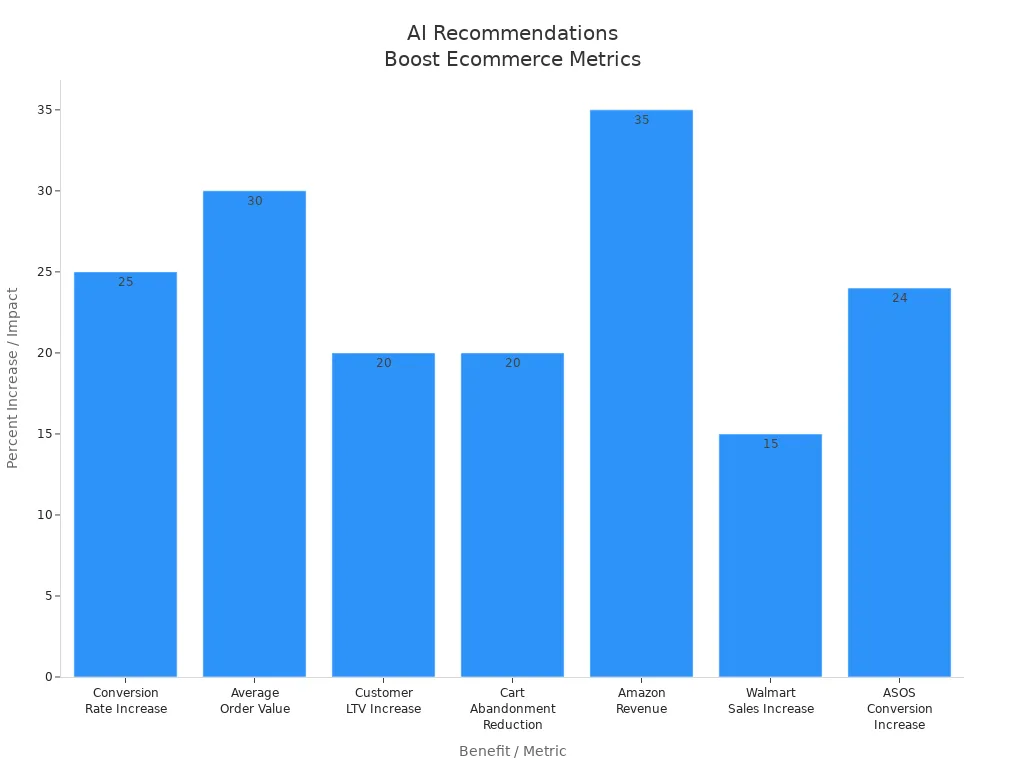
Dynamic Pricing Strategies
AI-driven dynamic pricing strategies allow ecommerce businesses to adjust prices in real time based on demand, competition, and customer behavior. Retailers using AI for pricing report profit margin increases of 10% to 25%. Amazon, for example, updates prices 2.5 million times daily to stay competitive. Sobot’s AI Solution supports dynamic pricing by integrating with ecommerce platforms and analyzing market trends, inventory, and customer data.
Key steps for implementing AI dynamic pricing include:
- Assess organizational readiness and define pricing goals.
- Integrate AI tools with ecommerce platforms for seamless data flow.
- Start with pilot groups to test pricing scenarios.
- Monitor and adjust pricing strategies continuously.
- Train employees to interpret AI pricing data.
AI-powered dynamic pricing not only increases profit margins but also improves customer engagement and inventory optimization. Studies show that 75% of consumers expect personalized pricing, and 62% are more likely to return to sites offering it. As ecommerce evolves, AI innovations like Sobot’s solutions help brands stay agile and competitive in customer service and pricing.
Omnichannel Ecommerce Customer Service
Seamless Channel Integration
Omnichannel ecommerce customer service connects every communication channel, allowing customers to move between live chat, phone, email, and social media without repeating information. This integration reduces frustration and increases satisfaction. Sobot’s platform enables brands to unify conversations from WhatsApp, SMS, and other channels, so agents always see the full customer history. Customers receive consistent messaging and support, no matter where they reach out.
- Customers switch channels easily, never needing to repeat details.
- Centralized data lets agents offer personalized recommendations and faster support.
- Integrated systems keep messaging consistent across all touchpoints.
- Omnichannel analytics help businesses monitor performance and anticipate needs.
- Personalized greetings and tailored product suggestions make customers feel valued.
- Brands like Disney and Virgin Atlantic use seamless integration to build loyalty and advocacy.
- Unified support systems lower resolution times and operational costs.
- Meeting modern expectations for seamless experiences gives companies a competitive edge.
Recent statistics show that businesses with omnichannel strategies retain 91% more customers year-over-year than those without. Companies with strong omnichannel customer engagement keep 89% of their customers, compared to only 33% for those with weak engagement. Omnichannel engagement also drives a 9.5% yearly increase in revenue (source).
| Statistic Description | Value / Percentage |
|---|---|
| Omnichannel retention rate | 91% greater year-over-year |
| Strong engagement retention | 89% vs. 33% |
| Revenue increase from omnichannel | 9.5% vs. 3.4% |
| Customers value experience as much as product | 88% |
| Social media response expectation | 54% expect replies within 3 hours |
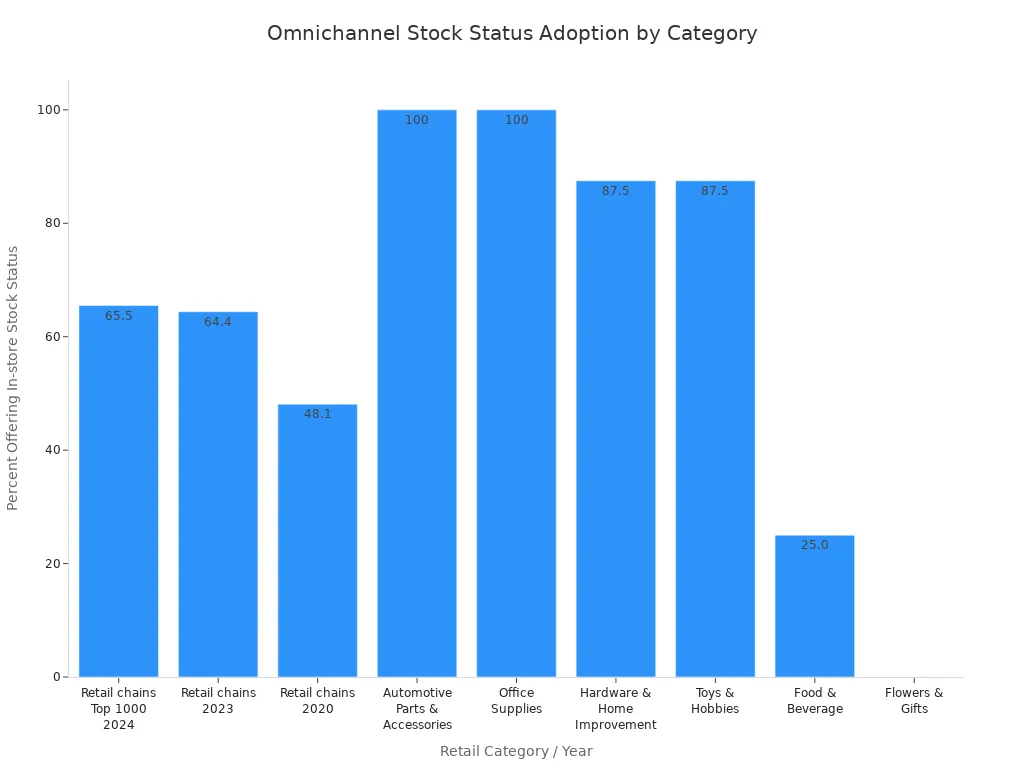
Unified Customer Data
Unified customer data gives ecommerce customer service teams a complete view of every shopper. Sobot’s AI-powered workspace brings together chat, voice, and ticketing data, so agents access real-time information without searching multiple systems. This approach increases productivity and speeds up issue resolution.
- Agents see customer profiles with purchase history, browsing behavior, and past interactions.
- Customers get consistent, quality service across all channels.
- Agent Assist technology uses unified data to improve first contact resolution.
- Centralized data prevents customers from repeating information, reducing effort.
- Integration with CRMs creates a single dashboard for agents and supervisors.
- Unified data supports AI tools that deliver personalized recommendations and marketing messages.
- Personalization increases satisfaction, loyalty, and convenience.
A unified data platform consolidates all customer information into one source of truth. Ecommerce teams use this foundation to unlock insights, personalize experiences, and optimize the customer journey. For example, when an associate accesses a shopper’s online purchase history, they can offer relevant promotions and guidance. This unification drives operational efficiency, customer satisfaction, and better business performance.
Tip: 70% of consumers spend more with companies offering personalized experiences. Personalized product recommendations can increase average order value by up to 12%.
Trust, Privacy, and Compliance
Data Security in AI
Ecommerce companies face serious challenges in protecting customer data when using AI. Data privacy, regulatory compliance, and cybersecurity threats remain top concerns. Companies must also manage messy data and prevent bias in AI systems. The table below highlights the main data security challenges and how AI-driven solutions address them:
| Data Security Challenge | Description | AI-Driven Solutions / Mitigations |
|---|---|---|
| Data Privacy & Regulatory Compliance | Protecting customer data and following global laws. | Data encryption, access controls, audit trails, and AI tools for compliance. |
| Cybersecurity Threats & Fraud | Preventing cyber attacks and fraud. | AI anomaly detection, fraud monitoring, and continuous risk assessment. |
| Data Scarcity & Messy Data | Handling unclear or limited data. | Machine learning for data cleaning and predictive analytics. |
| Biases & Hallucinations in AI | Avoiding unfair or false AI outcomes. | Bias detection, sentiment analysis, and ethical guidelines. |
| Ethical Use of AI | Ensuring transparency and accountability. | Ethical guidelines, monitoring, and stakeholder collaboration. |
Companies like Sobot use advanced AI tools to automate compliance management and strengthen data governance. Sobot’s platform supports GDPR and CCPA requirements, offering end-to-end encryption and real-time monitoring. These features help ecommerce brands maintain a strong security posture and protect customer support data. Automated compliance monitoring tools track regulatory changes and ensure continuous adherence (FTC guidelines).
Building Customer Trust
Building trust in AI-powered customer support starts with transparency and strong security practices. Companies should clearly inform customers when they interact with AI and explain its capabilities. Smooth handoffs from AI to human agents show commitment to resolving complex issues. Sobot’s omnichannel solutions provide seamless transitions and real-time status indicators, increasing user comfort.
Best practices for building trust include:
- Transparency about AI use and limitations.
- Strong data privacy measures, such as encryption and regular audits.
- Personalization that respects privacy and enhances value.
- Empathy through emotional AI that detects customer sentiment.
- Regular accountability checks and audits for ethical AI use.
- Visual feedback during AI interactions.
- Continuous learning and sharing improvements based on customer feedback.
- Measuring trust and effectiveness with customer surveys and performance metrics.
- Educating customers with FAQs and demos.
- Ethical AI practices to ensure fairness and transparency.
Sobot’s AI-powered customer support platform follows these best practices, helping brands build lasting relationships and improve retention. Companies that prioritize trust and compliance gain a competitive advantage and enhance their reputation in the ecommerce market (Gartner research).
AI-powered automation continues to transform ecommerce customer service. Brands see faster response times, higher satisfaction, and better sales. The market for AI agents is set to grow rapidly, with chatbots now handling up to 90% of routine queries. Companies like Sobot help businesses deliver 24/7 support and personalized recommendations, improving customer experience and retention. The chart below shows how automation and ai-driven customer experience boost key business metrics.
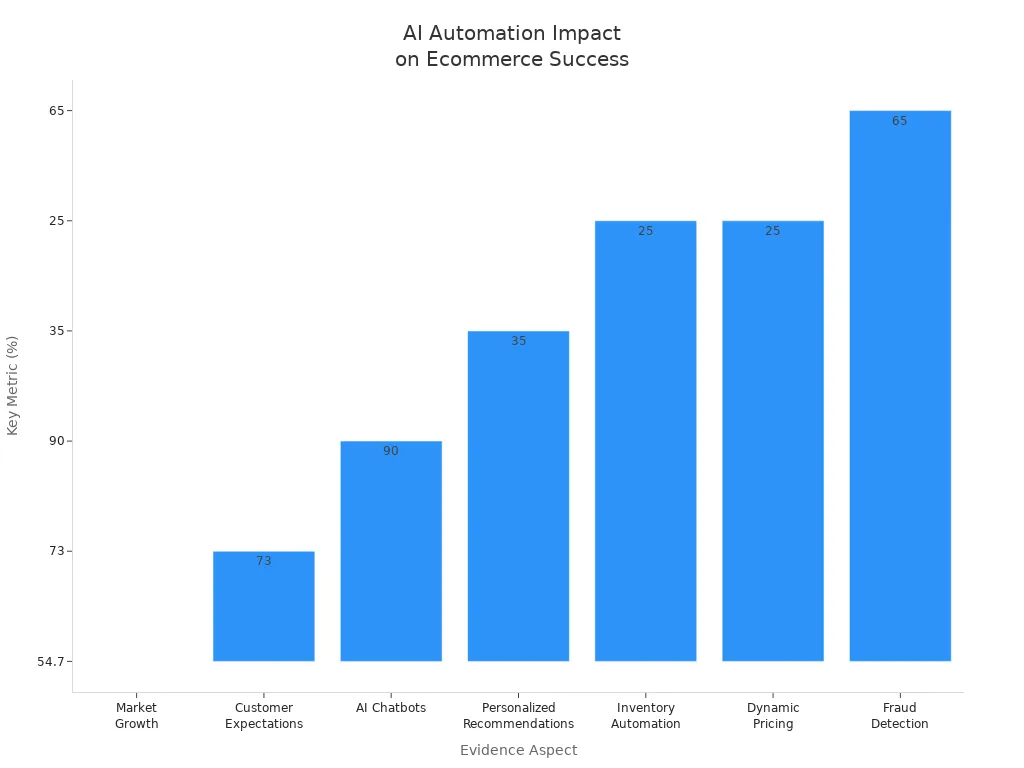
Brands that adopt these innovations gain a clear advantage. Sobot’s solutions empower companies to stay ahead and deliver future-ready customer service.
FAQ
What is AI-powered automation in ecommerce customer service?
AI-powered automation uses smart tools like chatbots to handle customer questions, order tracking, and returns. Sobot’s AI chatbot can resolve up to 70% of routine inquiries, helping ecommerce brands save up to 50% on support costs.
How does Sobot’s chatbot improve ecommerce customer service?
Sobot’s chatbot provides 24/7 support, answers questions in multiple languages, and works across channels like WhatsApp and SMS. This automation boosts agent productivity by 70% and increases customer satisfaction scores.
Is customer data safe with AI solutions like Sobot?
Sobot follows strict data security standards, including GDPR compliance and end-to-end encryption. The platform protects ecommerce customer service data and uses real-time monitoring to prevent unauthorized access. Learn more about data privacy at Sobot’s website.
Can AI chatbots personalize the ecommerce customer experience?
Yes! AI chatbots like Sobot’s use real-time data to recommend products and send personalized messages. This hyper-personalization increases conversion rates by up to 20% and helps ecommerce brands build loyalty.
Why should ecommerce brands choose Sobot for customer service automation?
Sobot offers an all-in-one contact center with AI-powered automation, multilingual chatbots, and omnichannel support. Trusted by brands like Weee! and Samsung, Sobot helps ecommerce businesses deliver fast, reliable, and secure customer service.
Tip: Brands using AI automation in ecommerce customer service see up to 50% faster response times and higher customer retention.
See Also
Ways Live Chat Tools Increase Ecommerce Sales Effectively
Chatbots Enhancing Customer Satisfaction In Online Shopping
Artificial Intelligence Agents Transform Customer Support Services
Best Live Chat Solutions For Ecommerce In 2024
Improving Efficiency With AI-Powered Customer Service Software
